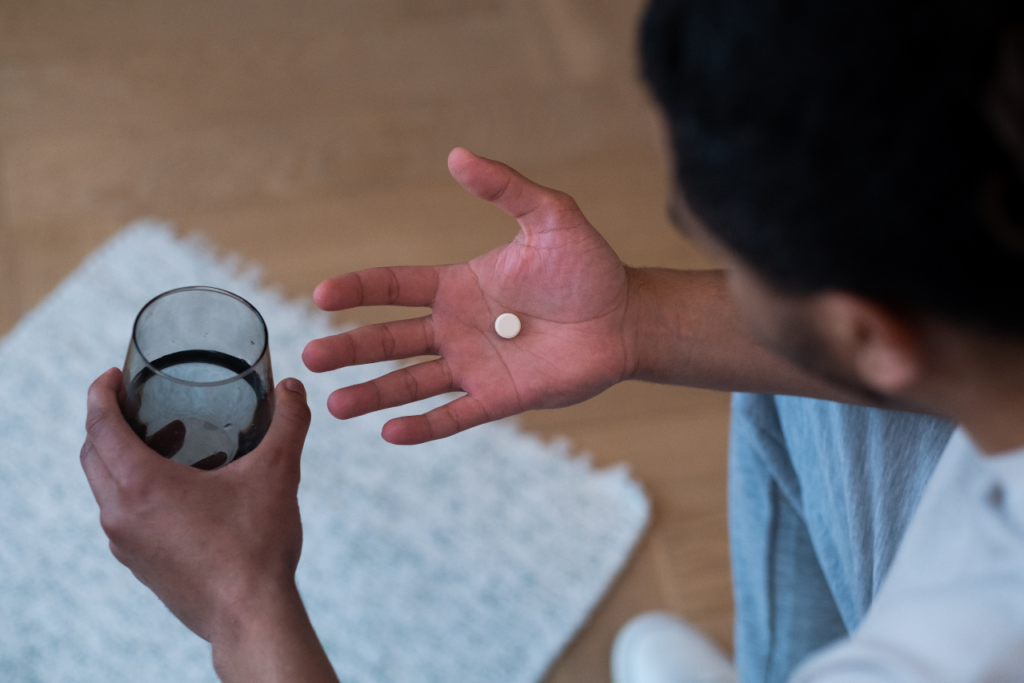What is Adderall tongue, and how can you get rid of it? Adderall tongue refers to a combination of side effects that affect the tongue and mouth, such as dry mouth, a sore or swollen tongue, bad breath, and difficulty tasting or swallowing. These symptoms can be uncomfortable but are often manageable with proper hydration and care.
If you’re experiencing Adderall tongue, making a few changes to your daily routine can help alleviate symptoms. Below, we’ll explore what Adderall tongue is, why it happens, and how to address it effectively.
What Is Adderall?
Adderall is a prescription medication that contains equal amounts of amphetamine and dextroamphetamine.
First approved by the U.S. Food and Drug Administration (FDA) in the mid-1990s, Adderall remains one of the most commonly prescribed medications for people who have attention-deficit hyperactivity disorder (ADHD). It is also approved to treat narcolepsy.
In addition to its authorized uses, Adderall is sometimes used illicitly as a brain-booster or study drug. This behavior is most common among college students, who use the drug to enhance their performance while studying for exams or working on time-intensive, detail-oriented projects.
How It Works
The two primary active ingredients in Adderall are both central nervous system (CNS) stimulants. When a person takes this medication, the drug causes increased levels of two chemical messengers, dopamine and norepinephrine.
Dopamine’s functions include influencing mood, memory, reward, and motivation. Norepinephrine is also involved with mood and memory, as well as arousal, the sleep-wake cycle, and the body’s fight-or-flight response.
Adderall prevents nerve cells from reabsorbing dopamine and norepinephrine after they have delivered their messages. This leads to a buildup of these chemicals in the synapses, which are the extremely small gaps that separate nerve cells throughout the CNS.
Elevated levels of dopamine and norepinephrine can lead to enhanced focus, better concentration, and an improved ability to acquire, store, and recall new information.
Side Effects
When used as directed by the physician who prescribed it, Adderall can be both safe and effective. Like all other prescription medications, though, it may also cause a variety of adverse effects.
Common side effects of Adderall use include:
- Headache
- Dry mouth
- Increased heart rate
- Lightheadedness
- Diminished appetite
- Mood swings
- Insomnia
- Nausea
- Diarrhea
More serious, but thankfully less common Adderall side effects include:
- Heart damage
- Heart attack
- Circulatory problems
- Reduced blood flow to hands and feet
- Blistering and peeling of the skin
- Seizure
- Psychosis
As we’ll discuss in the next section, some people who take this medication also develop a rare condition called Adderall tongue. Risk of this outcome appears to be highest among those who abuse Adderall by taking more than directed or using it without a prescription.
 What Is Adderall Tongue?
What Is Adderall Tongue?
Adderall tongue is an informal term that refers to combination of side effects that impact the mouth and tongue. These effects can include:
- Dry mouth and tongue
- Sore and/or swollen tongue
- Halitosis (bad breath)
- Sores or ulcers on the tongue or inside the mouth
- Burning sensation in the mouth
- Heightened sensitivity to hot food and beverages
- Difficulty tasting or swallowing
Adderall tongue can be exacerbated by stimulant-related behaviors such as grinding your teeth; biting your tongue, lips, or cheeks; frequently licking your lips, and sucking on your tongue.
Is Adderall Tongue Dangerous?
Adderall tongue can be quite uncomfortable, but it’s not usually dangerous. The likelihood of incurring some type of permanent damage to your mouth or tongue may increase if you ignore the problem, so you should take appropriate steps as soon as you notice symptoms.
Often, you can prevent or reverse Adderall tongue by making a few changes in your eating and drinking habits. Unless directed by your doctor, you should continue to take the medication, as abruptly ending your use could trigger a variety of unpleasant symptoms.
If you want to stop using Adderall, you should address this matter with your physician first. They can set up a plan to gradually reduce your Adderall use over the course of a few weeks, which should prevent or at least minimize withdrawal symptoms.
Treatment for Adderall Tongue
Dehydration seems to be the key component of Adderall tongue. Steps you can take to ensure proper hydration and alleviate the symptoms of Adderall tongue include:
- Drinking water on a regular basis throughout the day
- Eating hydrating foods such as celery, cucumbers, lettuce, asparagus, and watermelon
- Using a moisturizing mouth spray
- Minimizing your use of alcohol, tobacco, and caffeine
If Adderall tongue persists even after you’ve taken these steps, you should consult with the physician who prescribed the medication to you. They may suggest additional hydration techniques, adjust your dosage, or switch you to a different medication.
What Happens if I Can’t Stop Using Adderall?
The U.S. Drug Enforcement Agency (DEA) has classified Adderall as a Schedule II controlled substance. This classification is reserved for substances that, in the view of the U.S. government, have “a high potential for abuse, with use potentially leading to severe psychological or physical dependence.”
In other words, Adderall is addictive.
If you can’t stop using this medication, even after developing Adderall tongue or other experiencing other adverse effects, that could be a sign that you have developed an addiction.
The compulsions and loss of control that are characteristic of addiction can expose you to considerable harm. Thankfully, Adderall addiction is a treatable condition.
With proper professional care and a concerted effort on your part, you can end your Adderall use and learn to live a healthier life in recovery.

Find Adderall Addiction Treatment in Georgia
Serenity Grove is a premier provider of customized treatment for adults who have become addicted to Adderall and other prescription medications. We also serve patients whose struggles with addiction are accompanied by ADHD and other co-occurring mental health concerns.
When you choose our addiction rehab center in Athens, Georgia, you will be cared for by dedicated and talented treatment professionals within a safe and highly supportive environment. Our continuum of care includes detox, residential treatment, a partial hospitalization program (PHP), an intensive outpatient program (IOP), and an outpatient program (OP).
We’ll evaluate your needs, discuss your goals with you, and develop an individualized plan that can put you on the path toward successful, long-term recovery from Adderall addiction.
To learn more or to schedule a free assessment, please visit our Admissions page or call us today.


